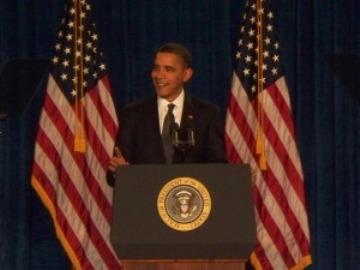
Section Branding
Header Content
Obama's Savannah Stump Has Legs
Primary Content

President Obama championed a minor provision of the energy bill in Savannah in March.
That provision is now one of the last standing in the energy bill.
Senate Democrats have backed-off their plans for a major energy bill, opting instead for more politically passable provision like HomeStar.
It would offer rebates for energy-efficient home improvements like air conditioners and duct work.
Obama visited Savannah specifically to promote HomeStar.
Denise Durrett of the Environmental Protection Agency says, HomeStar would work like the popular Cash-for-Clunkers program.
"It's really good to have a contractor come in and check your system, make sure everything is working properly, that everything is connected properly and answer any questions you may have about your system so that you know where things stand and you're not faced with an emergency replacement that can be very costly," says Durrett, the EPA's summer cooling spokesman for the related EnergyStar program. "It's just important to remember that every time you turn on a switch for a light or turn your dishwasher on, or your television, there's a power plant somewhere that's burning fossil fuels or coal. And that burning is creating greenhouse gas emissions which help lead to climate change."
Passed by the U.S. House in May, HomeStar would cost $5 billion.
President Obama visited Savannah Technical College, where students learn to install solar panels.
HomeStar, however, wasn't the main focus of news stories at the time.
They focused mainly on the visit's novelty, buzz and where Obama ate for lunch.
Tags: global warming, Savannah, Senate, energy, energy efficient, climate change legislation, Barack Obama, U.S. Environmental Protection Agency, Environmental Protection Agency, President Barack Obama, President Obama, energy efficient products, energy efficiency, climate change, climate change policy, GPB News, Savannah Technical College, HomeStar, global climate change, energy efficient appliances, United States Environmental Protection Agency
Bottom Content

